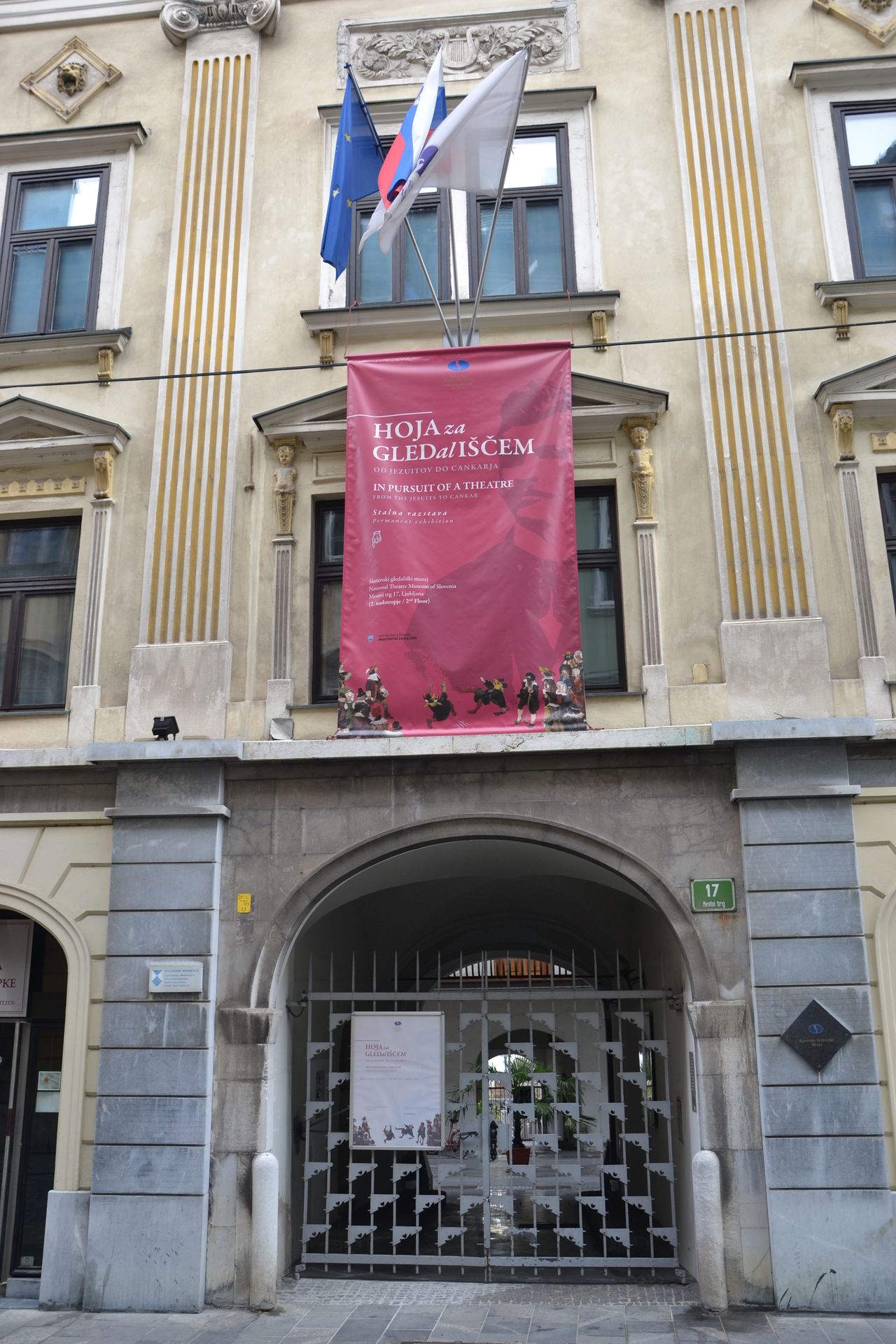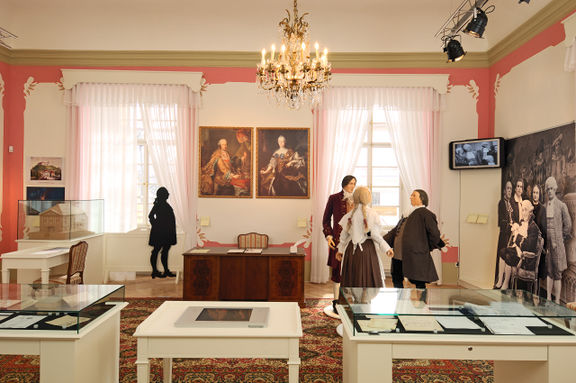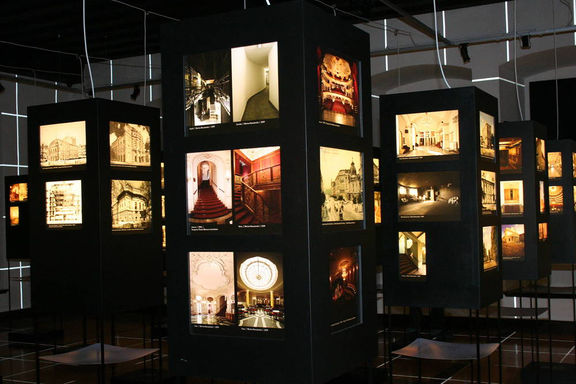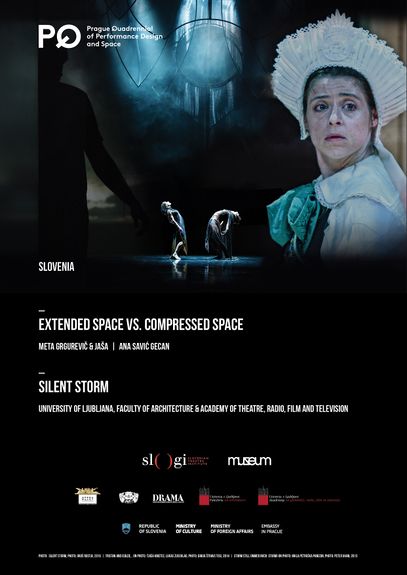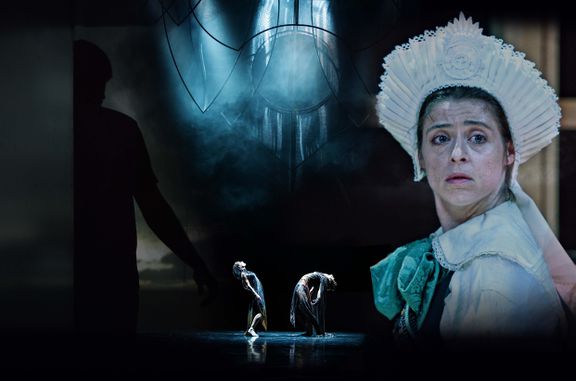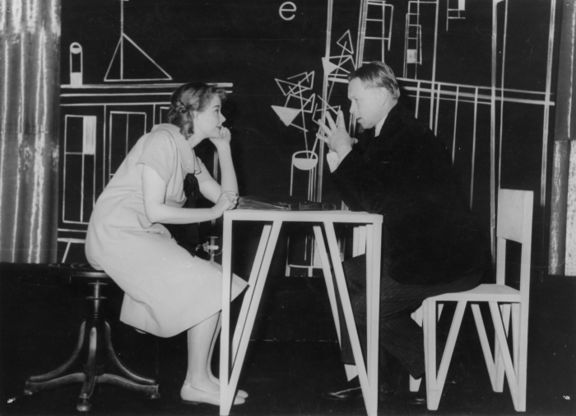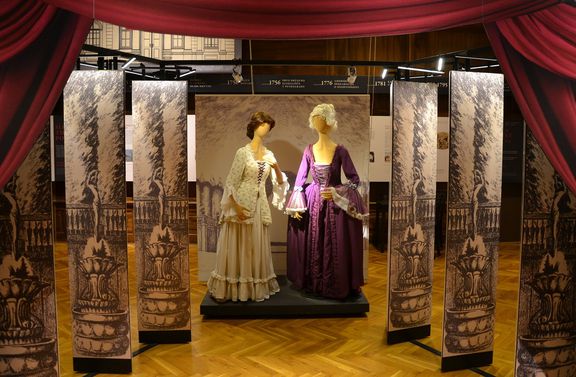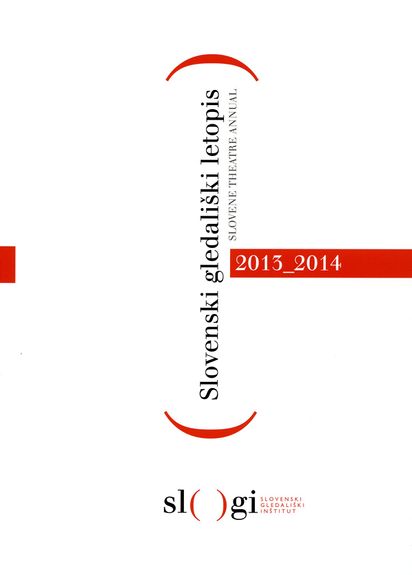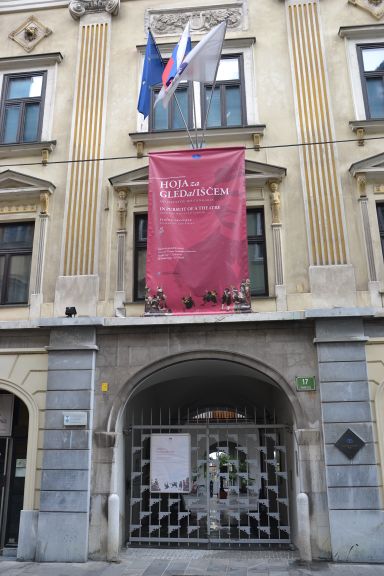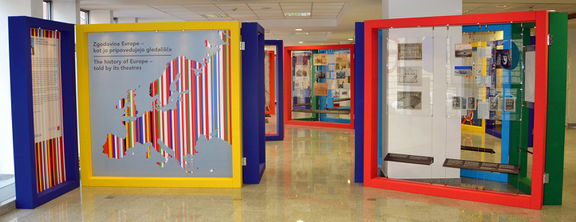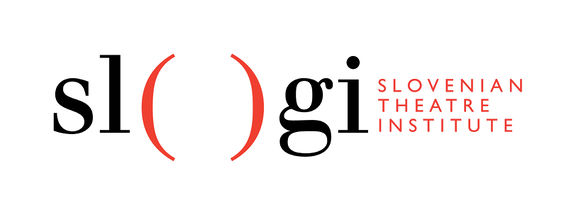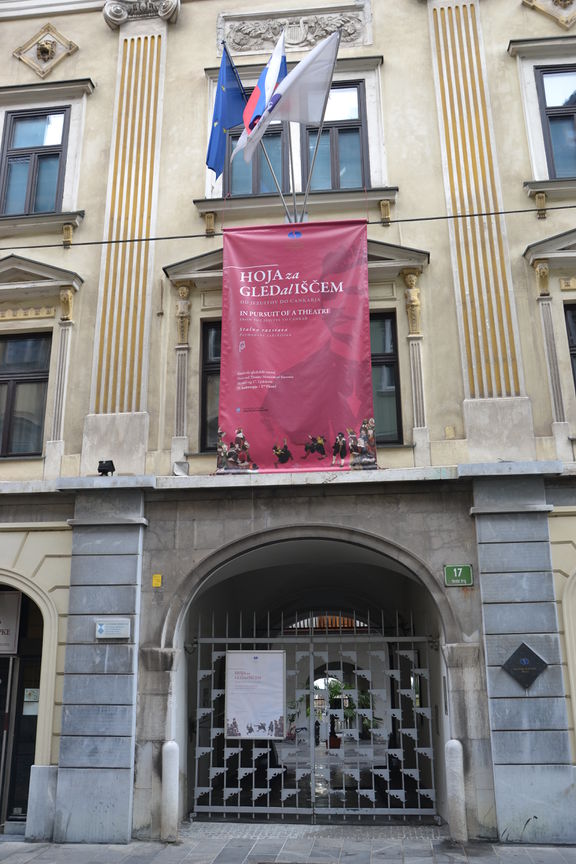Difference between revisions of "Slovenian Theatre Institute"
(contacts) |
(director) |
||
| (43 intermediate revisions by 6 users not shown) | |||
| Line 1: | Line 1: | ||
{{Article | {{Article | ||
| − | | status = | + | | status = NIFERTIK PHOTO |
| maintainer = Editor | | maintainer = Editor | ||
}} | }} | ||
| Line 6: | Line 6: | ||
| name = National Theatre Museum of Slovenia | | name = National Theatre Museum of Slovenia | ||
| localname = Slovenski gledališki inštitut (SLOGI) | | localname = Slovenski gledališki inštitut (SLOGI) | ||
| + | | logo = Slovenian Theatre Institute (logo).jpg | ||
| street = Mestni trg 17 | | street = Mestni trg 17 | ||
| town = SI-1000 Ljubljana | | town = SI-1000 Ljubljana | ||
| Line 12: | Line 13: | ||
| fax = 386 (0) 1 241 5816 | | fax = 386 (0) 1 241 5816 | ||
| email = slogi@slogi.si | | email = slogi@slogi.si | ||
| − | | website = | + | | website = https://www.slogi.si/ |
| founded by = Government of the Republic of Slovenia | | founded by = Government of the Republic of Slovenia | ||
| contacts = {{Contact | | contacts = {{Contact | ||
| − | | name = | + | | name = Gašper Troha |
| role = Director | | role = Director | ||
| − | | email = | + | | email = gasper.troha@slogi.si |
| + | | telephone = 386 (0) 1 241 5800 | ||
}} | }} | ||
{{Contact | {{Contact | ||
| name = Mihael Čepeljnik | | name = Mihael Čepeljnik | ||
| − | | role = | + | | role = Public relations, International cooperation |
| email = mihael.cepeljnik@slogi.si | | email = mihael.cepeljnik@slogi.si | ||
| − | + | | telephone = 386 (0) 1 241 5812 | |
| − | |||
| − | | | ||
| − | |||
| − | |||
| − | |||
| − | |||
| − | |||
| − | |||
| − | |||
| − | |||
| − | |||
| − | |||
| − | |||
| − | |||
| − | |||
| − | |||
| − | |||
| − | |||
| − | |||
| − | |||
| − | |||
| − | |||
| − | |||
| − | |||
| − | |||
| − | |||
| − | |||
| − | |||
| − | |||
}} | }} | ||
| accounts = | | accounts = | ||
| − | https://www.facebook.com/ | + | https://www.facebook.com/SLOGI.SI |
}} | }} | ||
| − | {{Teaser| | + | {{Teaser |
| − | The [[Slovenian Theatre Institute]] (SLOGI) was founded in [[established::2014]] as | + | |image = Slovenian_Theatre_Institute_2015_entrance.JPG |
| + | | | ||
| + | The [[Slovenian Theatre Institute]] (SLOGI) was founded in [[established::2014]] as the successor to the [[Depot:National Theatre Museum of Slovenia|National Theatre Museum of Slovenia]]. The institute is engaged in collecting, preserving, documenting, researching, interpreting, presenting and promoting Slovenian theatre culture, performing arts heritage as well as contemporary theatre practices, both at the national and international level. | ||
| − | + | SLOGI organises exhibitions and presents virtual exhibitions, publishes books from the field of theatre, organises various events (symposia, round tables, lectures, etc.) and educational activities, houses theatre performances, etc. In November 2015, it launched the monthly ''Slovenian Theatre News''. | |
| − | + | The institute has participated in several international projects. In the period 2019–2023 a new EU supported project was launched: ''Classics in the Graphic Novel: A pilot model of new high school culture education through graphic novels'' coordinated by SLOGI, in collaboration with partners from Poland and Slovakia. | |
| + | SLOGI is also a national coordinator for arts and cultural education in the field of theatre, nominated by the Ministry of Culture. | ||
}} | }} | ||
| + | |||
| + | {{TeaserSlo|SLOGI se ukvarja z zbiranjem, ohranjanjem, dokumentiranjem, raziskovanjem, interpretiranjem, predstavljanjem in promocijo slovenske gledališke kulture, uprizoritvene umetniške dediščine ter sodobnih gledaliških praks, tako na nacionalni kot na mednarodni ravni. }} | ||
| + | |||
== History == | == History == | ||
The [[Depot:National Theatre Museum of Slovenia|National Theatre Museum of Slovenia]] was established in 1952 under the aegis of the Slovene National Theatre in Ljubljana, to mark the 60th anniversary of the Provincial Theatre in Ljubljana. | The [[Depot:National Theatre Museum of Slovenia|National Theatre Museum of Slovenia]] was established in 1952 under the aegis of the Slovene National Theatre in Ljubljana, to mark the 60th anniversary of the Provincial Theatre in Ljubljana. | ||
| − | The museum's first director was [[Janko Traven]], who collected an enormous amount of material from the early periods of Slovene theatrical history. The museum was also supported by private donors. [[Janko Traven|Janko Traven's]] successor [[Dušan Moravec]] began to organise the collected material more systematically, and in 1964 the museum began issuing various publications, including ''Letopis'' or ''The Repertoire of Slovene Theatres'' (to mark the 100th anniversary of Ljubljana Drama Society) and the magazine ''Documents of the Slovene Theatre Museum'', which continues to be published | + | The museum's first director was [[Janko Traven]], who collected an enormous amount of material from the early periods of Slovene theatrical history. The museum was also supported by private donors. [[Janko Traven|Janko Traven's]] successor [[Dušan Moravec]] began to organise the collected material more systematically, and in 1964 the museum began issuing various publications, including ''Letopis'' or ''The Repertoire of Slovene Theatres'' (to mark the 100th anniversary of Ljubljana Drama Society) and the magazine ''Documents of the Slovene Theatre Museum'', which continues to be published biennially today. The ''Repertoire'' has been digitalised and included in the [[Sigledal.org - Slovene theatre portal]]. |
| − | In 1978 the Theatre Museum merged with the Film Museum to become the National Theatre and Film Museum, and in 1990 this institution acquired new display rooms and | + | In 1978, the Theatre Museum merged with the Film Museum to become the National Theatre and Film Museum, and in 1990, this institution acquired new display rooms and office space at Mestni trg in Ljubljana's Old Town. However, in August 1996, the museum was divided into two independent institutions – the National Theatre Museum of Slovenia and the [[Slovenian Cinematheque]]. |
| − | In 2014 the Slovenian Theatre Institute was founded as | + | In 2014, the Slovenian Theatre Institute was founded as the successor to the National Theatre Museum of Slovenia. |
== Departments == | == Departments == | ||
| − | + | ''Ikonoteka'', an image library, collects posters, costume design drafts, programmes, portraits and plans, as well as plans and photographs of theatre sets, while the AV Archive collects, preserves, and facilitates internal study access to audio and visual recordings of theatre productions. | |
| − | The Slovenian Theatre Institute Archive comprises personal documents, correspondence, legal and self-management acts, manuscript and typed texts, albums and collected newspaper reviews, plus thematically-arranged archive material on Slovene theatres, in particular legal and self-management acts, circulars, decrees and minutes of meetings. There is also a collection of articles relating to dramatic productions, opera, ballet, film, and experimental theatre covering the period 1963–1996. | + | The Slovenian Theatre Institute Archive comprises personal documents, correspondence, legal and self-management acts, manuscript and typed texts, albums and collected newspaper reviews, plus thematically-arranged archive material on Slovene theatres, in particular, legal and self-management acts, circulars, decrees and minutes of meetings. There is also a collection of articles relating to dramatic productions, opera, ballet, film, and experimental theatre covering the period 1963–1996. |
| − | + | ''Letopis'', a list of precisely catalogued premières in Slovene theatres that were published since 1867 and later developed into a database that covers the entire history of Slovene professional and the experimental theatre was digitalised and put online in collaboration with the [[Sigledal.org - Slovene theatre portal]]. | |
See also the article about the [[Slovenian Theatre Institute Library]]. | See also the article about the [[Slovenian Theatre Institute Library]]. | ||
| − | == Exhibitions | + | == Exhibitions== |
| − | + | {{image|Slovenian Theatre Institute 2015 Permanent exhibition.JPG}} | |
| − | The | + | In December 2013, the permanent exhibition ''In pursuit of a theatre. From the Jesuits to Cankar'' was opened at the institute's premises. The exhibition presents the beginnings and the main development of theatre in Slovenia, its integration into European cultural context and its role in shaping Slovenian national awareness. In 2017 on the occasion of the 150th anniversary of the Drama Society in Ljubljana the institute prepared a temporary exhibition ''About the Roads to »The Grandest Invention of Human Spirit« in Slovenia: Milestones in the Development of the Drama Society in Ljubljana.'' |
| − | The | + | The museum has organised various exhibitions also in other galleries. In 2006, it cooperated with the [[Municipal Museum of Radovljica]] in preparing the [[Anton Tomaž Linhart]] Memorial Room. |
| − | + | In 2015 the exhibition ''Borštnik Bound!'' was prepared to present the beginning, the development and the atmosphere of the [[Maribor Theatre Festival]], while simultaneously trying to catch the Zeitgeist by drawing parallels between the Festival events and the life of Maribor during a 50 year period. The exhibition took place at the [[Maribor National Liberation Museum]], a part of it also at the [[Slovene National Theatre Nova Gorica]]. | |
| − | + | In 2016 a multimedia cultural and historical exhibition ''Hamlet in Slovenia'' presented at [[Cankarjev dom, Cultural and Congress Centre]] on occasion of the 400th anniversary of William Shakespeare's death, attracted wide audiences. [[Slovene Permanent Theatre in Trieste]] hosted a part of the exhibition. In 2018, the institute cooperated in the preparation of significant exhibitions on occasion of the 100th anniversary of [[Ivan Cankar]]'s death: ''Ivan Cankar and Europe'' in Cankarjev dom, and ''Ivan Cankar'' in the [[City Museum of Ljubljana]]. | |
| − | In | + | |
| + | {{YouTube|pT67knF80Z0}} | ||
| + | |||
| + | The first extensive retrospective exhibition of Slovenian stage set design ''The Space within the Space: Scenography in Slovenia before 1991'' took place in 2019 at the [[National Gallery of Slovenia]]. A part of the exhibition was presented also at the [[UGM Studio]] in Maribor, in collaboration with the [[Maribor Art Gallery]] (UGM) and the [[Maribor Theatre Festival]]. | ||
| + | |||
| + | === e-xhibitions === | ||
| + | |||
| + | Since 2012 the institute has prepared a number of virtual exhibitions of digitalised heritage. The first one was ''Alenka Bartl, Costume Designer'', as a digital follow-up to the exhibition of a renowned costume designer [[Alenka Bartl]] (1930&ndas;2018) at the [[National Gallery of Slovenia]]. Some further digital galleries that feature award-winning productions from the [[Maribor Theatre Festival]] (2011&ndas;2014) and the winners of the [[Borštnik Ring Award and Borštnik Awards]], Slovenian Hamlets, About the Roads to“the Grandest Invention of Human Spirit” in Slovenia, etc., are accessible to a wide public on the [[Sigledal.org - Slovene theatre portal]]. Also the museum portal Museums offers a selection of institute's e-xhibitions: From our collections: [[Josip Primožič – Tošo]], set-designer; [[Fran Milčinski]], playwright; [[Miha Maleš]]: Portraits, Set design sketches by [[Milan Butina]] and the The Century of [[Ivan Cankar]]'s ''Serfs''. | ||
| + | |||
| + | |||
| + | == Publishing == | ||
| + | |||
| + | Apart from the regular periodic publications, such as ''Documents'' (''Dokumenti''), which include texts on Slovenian theatre history and monographs, the ''Slovenian Theatre Annual'' (''Letopis'') editions, which is the continuation of the bibliography ''The Repertoire of Slovenian Theatres 1867–1967'' (''Repertoar slovenskih gledališč 1867–1967''), and [[Amfiteater Journal]], a journal of performing arts theory edited in collaboration with the AGRFT, the Slovenian Theatre Institute also publishes monographs on Slovenian theatre creators, the activity of Slovenian theatre, and performing arts movements. | ||
| + | |||
| + | == Arts and cultural education in the field of theatre == | ||
| + | |||
| + | As a national coordinator for arts and cultural education in the field of theatre, Slovenian Theatre Institute operates the ''Gleda(l)išče project'', which is designed as a sample strategy model for flexible forms of teaching, promoting partnerships between educational institutions and cultural institutions and creators. It introduces informal, creative, and cultural and educational approaches into the formal teaching environment. A multiannual programme (2016–2021) is cofunded by the European Union from the European Social Fund. | ||
| + | |||
| + | The basic module of the project is the ''Golden Stick (Zlata paličica)'' platform, which provides a comprehensive web-based environment that lists high-quality theatre performances for children and youth, and recommended arts and cultural education content in the field of theatre. The related [[:Slovene_National_Theatre_Maribor#Prvi_prizor_educational_programme|Prvi prizor (The First Scene) programme]] is operated by the [[SNG Maribor]]. | ||
| + | |||
| + | == International cooperation == | ||
| + | |||
| + | |||
| + | === ''Classics in the Graphic Novel'', a pilot educational model === | ||
| − | + | In the period 2019–2023 the Slovenian Theatre Institute coordinates the EU supported project focusing on the development of an innovative, cross-sectoral and interdisciplinary pilot model of the culture and arts education in high schools through graphic novels, collaborating with Adam Mickiewicz Institute, Poland, and the Theatre Institute Bratislava, Slovakia. | |
| − | + | === Theatre Architecture in Central Europe === | |
| − | + | In the period 2008–2011, the National Theatre Museum collaborated in a complex international project entitled ''Theatre Architecture in Central Europe (TACE)'' led by the Theatre Institute in Prague. In spring 2009, Ljubljana hosted around 70 architecture students in the introductory workshop ''Visions and Possibilities'' organised by [[Vojteh Ravnikar|Vojteh Ravnikar's]] seminar at the [[Faculty of Architecture, University of Ljubljana]]. Afterwards, the students developed their own visions of a potential new Slovene National Theatre building for the given location in the Ljubljana city centre with their tutors at their home universities (in Bratislava, Brno, Budapest, Gdańsk, Gliwice, Liberec, Ljubljana and Prague). Later, they revealed their ideas at an exhibition in autumn 2009 at Ljubljana [[City Hall Atria]] and in a catalogue. | |
| − | In the | + | In November 2009, a symposium on experimental theatre spaces was held in Ljubljana, followed by the publication ''Occupying Spaces''. The extensive TACE exhibition ''Beyond Everydayness – Theatre Architecture in Central Europe'', which toured Budapest, Prague, Warsaw and Bratislava, was hosted by the [[Museum of Architecture and Design]] in Ljubljana along with an accompanying publication synthesising pioneer research in the field of theatre architecture. |
| − | + | {{wide image|Museum of Architecture and Design 2011 Beyond Everydayness, Theatre Architecture in Central Europe exhibition.jpg}} | |
=== European Route of Historic Theatres === | === European Route of Historic Theatres === | ||
| − | As a kind of follow-up SLOGI joined another EU supported project for the period 2012–2017: ''European Route of Historic Theatres'' organised by Perspectiv, Association of Historical Theatres of Europe based in Berlin, hand-in-hand with | + | As a kind of follow-up, SLOGI joined another EU supported project for the period 2012–2017: ''European Route of Historic Theatres'' organised by Perspectiv, Association of Historical Theatres of Europe based in Berlin, hand-in-hand with partners from 12 countries. The ''Adriatic Route of Historic Theatres'' comprises also the historical buildings of the [[SNG Maribor]] and [[SNG Drama Ljubljana]]. In the period 2015–2017, the touring exhibition ''The History of Europe – told by its theatres'' was presented at theatre museums in Warsaw, Copenhagen, Vienna, Munich, Ljubljana and London. |
| + | |||
| + | {{wide image|Slovenian Theatre Institute 2016 European Route of Historic Theatres exhibition Ljubljana.jpg}} | ||
| + | |||
| + | === Prague Quadrennial of Performance Design and Space === | ||
| + | |||
| + | In 2003, the museum organised the presentation of a costume from the ''Oedipus Rex'' production of the [[Slovene National Theatre Opera and Ballet Ljubljana]] at the Prague Quadrennial of Performance Design and Space (PQ). In 2011, the four authors presented in Prague were: [[Ema Kugler]], [[Dunja Zupančič]], and [[Miha Turšič]] in the section ''Countries and Regions'', curated by [[Tomaž Toporišič]]; while a costume from ''A Journey to Rome (Caravaggio)'' (produced by [[Slovene National Theatre Maribor]]) created by [[Belinda Radulović]] was part of the ''Extreme Costume Design Section''. | ||
| + | |||
| + | The PQ 2015 featured the installation curated by [[Barbara Novakovič Kolenc]] based on the set design by [[Meta Grgurevič]] and [[JAŠA]] for the ballet ''Tristan and Isolde'' (the national Opera and Ballet production of 2014) and on the costumes designed by [[Ana Savić Gecan]] for the performance ''Storm Still'' ([[SNG Drama Ljubljana]]). SLOGI has collaborated also with the [[Faculty of Architecture, University of Ljubljana]] and the [[Academy of Theatre, Radio, Film and Television (AGRFT)]] that prepare an installation for the PQ Student Section. | ||
| + | |||
| + | The PQ 2019 featured the installation ''Warped Space'' curated by [[Barbara Novakovič Kolenc]], presenting the opus selection of 7 authors/art collectives ([[Angelina Atlagić]], [[Uroš Belantič]], [[Mateja Bučar]] & [[Vadim Fiškin]], [[IRWIN]], [[Leo Kulaš]] and NUMEN). [[:Category:Prague Quadrennial of Performance Design and Space (PQ)|More information on PQ]] | ||
== See also == | == See also == | ||
* [[Slovenian Theatre Institute Library]] | * [[Slovenian Theatre Institute Library]] | ||
| + | * [[Amfiteater Journal]] | ||
* [[Sigledal.org - Slovene theatre portal]] | * [[Sigledal.org - Slovene theatre portal]] | ||
* [[Maribor Theatre Festival]] | * [[Maribor Theatre Festival]] | ||
| − | |||
== External links == | == External links == | ||
*[http://www.slogi.si National Theatre Museum of Slovenia website] | *[http://www.slogi.si National Theatre Museum of Slovenia website] | ||
| − | *[ | + | * [https://www.zlatapalicica.si ''Golden Stick (Zlata paličica)'' platform] |
| − | *[ | + | *[https://museums.eu/museum/details/57/slovenian-theatre-institute) Slovenian Theatre Institute profile at Museums.si] |
| + | *[https://www.europeana.eu/portal/en/search?q=Slovenian+theatre+institute&f%5BPROVIDER%5D%5B%5D=ECLAP%2C+e-library+for+Performing+Arts Slovenian Theatre Institute's collection on Europeana (contributed through the ECLAP project)] | ||
| + | |||
| + | *[https://www.slogi.si/en/slovenian-theatre-news Slovenian Theatre News Archive since November 2015] | ||
| − | + | *[https://www.slogi.si/en/about-the-museum/exhibitions-2/?wpv_view_count=1429-CATTR969a80518bc65bd89695f2874fce9a05&wpv-vrsta-razstave=virtual-exhibition&wpv-letnik=0&wpv_post_search=&wpv_filter_submit=Search Links to the SLOGI virtual exhibitions] | |
| − | *[ | ||
| − | + | *[https://www.slogi.si/en/classicsinthegraphicnovel/ Classics in the Graphic novel EU project] | |
| − | *[ | ||
| − | |||
| − | |||
| − | |||
* [http://www.theatre-architecture.eu/en/ Theatre Architecture in Central Europe project website] | * [http://www.theatre-architecture.eu/en/ Theatre Architecture in Central Europe project website] | ||
| − | *[http://www.theatre-architecture.eu/db | + | *[http://www.theatre-architecture.eu/db Database (with galleries) of 15 Slovene theatre houses at the TACE website] |
| − | * [http://www.theatre-architecture.eu/student-projects.html Student competition's results | + | * [http://www.theatre-architecture.eu/student-projects.html Student competition's results – A new theatre for the 21st Century in Ljubljana] |
| − | |||
{{Gallery}} | {{Gallery}} | ||
| Line 148: | Line 157: | ||
[[Category:Producers]] | [[Category:Producers]] | ||
[[Category:Publishers]] | [[Category:Publishers]] | ||
| + | [[Category:Literature publishers]] | ||
[[Category:Exhibition organisers]] | [[Category:Exhibition organisers]] | ||
| Line 166: | Line 176: | ||
[[Category:EU Culture funding recipient]] | [[Category:EU Culture funding recipient]] | ||
[[Category:Prague Quadrennial of Performance Design and Space (PQ)]] | [[Category:Prague Quadrennial of Performance Design and Space (PQ)]] | ||
| + | [[Category:National cultural institutions]] | ||
| + | [[Category:Theatre & Dance]] | ||
| + | [[Category:Dance_archives_and_resources]] | ||
| + | [[Category:Music_museums_and_collections]] | ||
| + | [[Category:Education_and_Research]] | ||
| + | [[Category:Theatre_archives_and_libraries]] | ||
| + | [[Category:Theatre_research]] | ||
Latest revision as of 02:07, 27 February 2023
-
to
16 Feb 2024
31 Mar 2024
"Möderndorfer Theatre - Gledališče Möderndorfer", a photography exhibition of Vinko Möderndorfer's directoral opus, based on his book with the same title. Prepared by Slovenian Theatre Institute and Forum Ljubljana, designed by Nina Šturm, with Tea Rogelj as the curator and with English translations by Nataša Jelič.
-
to
10 Nov 2017
7 Jan 2018
The touring exhibition The history of Europe - told by its theatres, a part of the European Route of Historic Theatres EU supported project, with Slovenian Theatre Institute participating,
-
to
22 Mar 2017
3 Sep 2017
"The history of Europe - told by its theatres" touring exhibition, a part of the European Route of Historic Theatres EU project, with Slovenian Theatre Institute participating,
-
to
17 Jan 2017
25 Feb 2017
"The history of Europe - told by its theatres" touring exhibition, a part of the European Route of Historic Theatres project, with Slovenian Theatre Institute participating,
-
to
13 May 2016
5 Oct 2016
"The history of Europe - told by its theatres" touring exhibition, a part of the European Route of Historic Theatres project, with Slovenian Theatre Institute participating,
-
to
22 Oct 2015
28 Mar 2016
"The history of Europe - told by its theatres" ehibition, a part of the European Route of Historic Theatres project, with Slovenian Theatre Institute participating,
-
to
18 Jun 2015
28 Jun 2015
Meta Grgurevič, JAŠA as set designers and Ana Savić Gecan, costume designer, selected by Barbara Novakovič Kolenc, and students of the Faculty of Architecture, University of Ljubljana and Academy of Theatre, Radio, Film and Television (AGRFT) presented at the Prague Quadrennial of Performance Design and Space (PG). Produced by Slovenian Theatre Institute and Muzeum Institute, in cooperation with Slovene National Theatre Drama Ljubljana and Slovene National Theatre Opera and Ballet Ljubljana, supported by the Embassy of the Republic of Slovenia Prague
-
to
13 May 2015
5 Oct 2015
The touring exhibition "The history of Europe - told by its theatres", created as part of the European Route of Historic Theatres project, Slovenian Theatre Institute participating,
-
to
9 May 2015
26 Jul 2015
Bauhaus – Networking Ideas and Practice (BAUNET), an exhibition also also featuring the works of August Černigoj from the collections of the Avgust Černigoj Gallery, Lipica and the Slovenian Theatre Institute
-
to
10 Feb 2015
30 Apr 2015
The touring exhibition "The history of Europe - told by its theatres", created as part of the European Route of Historic Theatres project, Slovenian Theatre Institute participating,
-
to
2 Apr 2014
4 Apr 2014
Barbara Novakovič Kolenc's lecture Pendulum Movements and the Dynamics of Spaces in the Arts', at the SharedSpace: Spatial Curation Symposium, Prague Quadrienal of Performance Design and Space, National Theatre Museum of Slovenia and Muzeum Institute
-
to
9 Sep 2010
10 Oct 2010
Beyond Everydayness – Theatre Architecture in Central Europe, a 2010 touring exhibition (Budapest–Prague–Warsaw–Bratislava–Ljubljana) co-organised by the National Theatre Museum of Slovenia
-
to
6 Jul 2010
28 Jul 2010
Beyond Everydayness – Theatre Architecture in Central Europe, a 2010 touring exhibition (Budapest–Prague–Warsaw–Bratislava–Ljubljana) co-organised by the National Theatre Museum of Slovenia
-
to
12 May 2010
6 Jun 2010
Beyond Everydayness – Theatre Architecture in Central Europe, a 2010 touring exhibition (Budapest–Prague–Warsaw–Bratislava–Ljubljana) co-organised by the National Theatre Museum of Slovenia
-
to
26 Mar 2010
30 Apr 2010
Beyond Everydayness – Theatre Architecture in Central Europe, a 2010 touring exhibition (Budapest–Prague–Warsaw–Bratislava–Ljubljana) co-organised by the National Theatre Museum of Slovenia
History
The National Theatre Museum of Slovenia was established in 1952 under the aegis of the Slovene National Theatre in Ljubljana, to mark the 60th anniversary of the Provincial Theatre in Ljubljana. The museum's first director was Janko Traven, who collected an enormous amount of material from the early periods of Slovene theatrical history. The museum was also supported by private donors. Janko Traven's successor Dušan Moravec began to organise the collected material more systematically, and in 1964 the museum began issuing various publications, including Letopis or The Repertoire of Slovene Theatres (to mark the 100th anniversary of Ljubljana Drama Society) and the magazine Documents of the Slovene Theatre Museum, which continues to be published biennially today. The Repertoire has been digitalised and included in the Sigledal.org - Slovene theatre portal.
In 1978, the Theatre Museum merged with the Film Museum to become the National Theatre and Film Museum, and in 1990, this institution acquired new display rooms and office space at Mestni trg in Ljubljana's Old Town. However, in August 1996, the museum was divided into two independent institutions – the National Theatre Museum of Slovenia and the Slovenian Cinematheque. In 2014, the Slovenian Theatre Institute was founded as the successor to the National Theatre Museum of Slovenia.
Departments
Ikonoteka, an image library, collects posters, costume design drafts, programmes, portraits and plans, as well as plans and photographs of theatre sets, while the AV Archive collects, preserves, and facilitates internal study access to audio and visual recordings of theatre productions.
The Slovenian Theatre Institute Archive comprises personal documents, correspondence, legal and self-management acts, manuscript and typed texts, albums and collected newspaper reviews, plus thematically-arranged archive material on Slovene theatres, in particular, legal and self-management acts, circulars, decrees and minutes of meetings. There is also a collection of articles relating to dramatic productions, opera, ballet, film, and experimental theatre covering the period 1963–1996.
Letopis, a list of precisely catalogued premières in Slovene theatres that were published since 1867 and later developed into a database that covers the entire history of Slovene professional and the experimental theatre was digitalised and put online in collaboration with the Sigledal.org - Slovene theatre portal.
See also the article about the Slovenian Theatre Institute Library.
Exhibitions
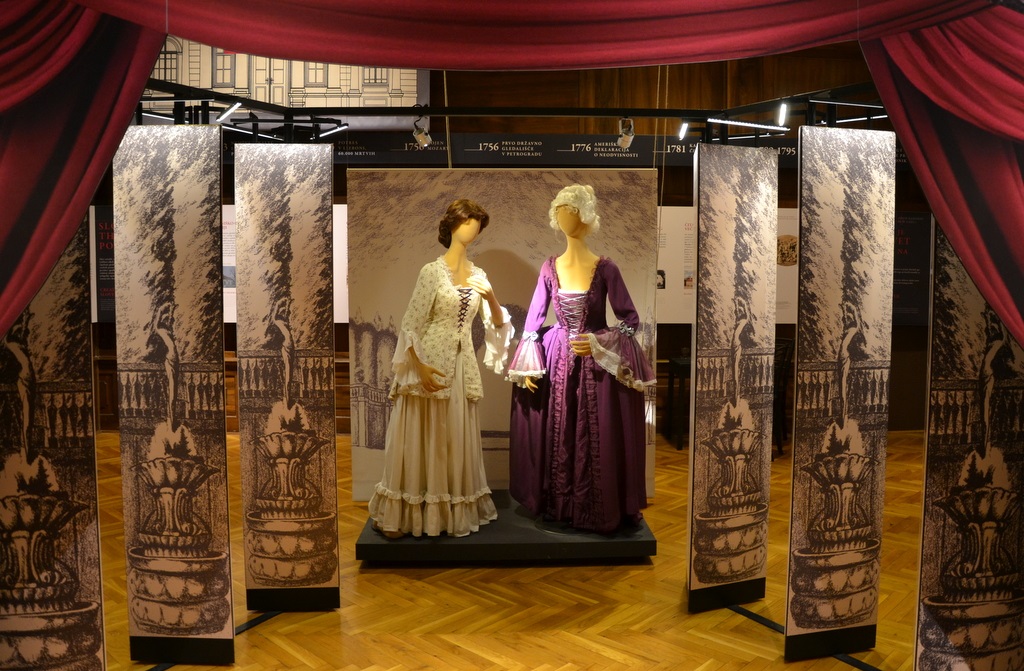
In December 2013, the permanent exhibition In pursuit of a theatre. From the Jesuits to Cankar was opened at the institute's premises. The exhibition presents the beginnings and the main development of theatre in Slovenia, its integration into European cultural context and its role in shaping Slovenian national awareness. In 2017 on the occasion of the 150th anniversary of the Drama Society in Ljubljana the institute prepared a temporary exhibition About the Roads to »The Grandest Invention of Human Spirit« in Slovenia: Milestones in the Development of the Drama Society in Ljubljana.
The museum has organised various exhibitions also in other galleries. In 2006, it cooperated with the Municipal Museum of Radovljica in preparing the Anton Tomaž Linhart Memorial Room.
In 2015 the exhibition Borštnik Bound! was prepared to present the beginning, the development and the atmosphere of the Maribor Theatre Festival, while simultaneously trying to catch the Zeitgeist by drawing parallels between the Festival events and the life of Maribor during a 50 year period. The exhibition took place at the Maribor National Liberation Museum, a part of it also at the Slovene National Theatre Nova Gorica.
In 2016 a multimedia cultural and historical exhibition Hamlet in Slovenia presented at Cankarjev dom, Cultural and Congress Centre on occasion of the 400th anniversary of William Shakespeare's death, attracted wide audiences. Slovene Permanent Theatre in Trieste hosted a part of the exhibition. In 2018, the institute cooperated in the preparation of significant exhibitions on occasion of the 100th anniversary of Ivan Cankar's death: Ivan Cankar and Europe in Cankarjev dom, and Ivan Cankar in the City Museum of Ljubljana.
The first extensive retrospective exhibition of Slovenian stage set design The Space within the Space: Scenography in Slovenia before 1991 took place in 2019 at the National Gallery of Slovenia. A part of the exhibition was presented also at the UGM Studio in Maribor, in collaboration with the Maribor Art Gallery (UGM) and the Maribor Theatre Festival.
e-xhibitions
Since 2012 the institute has prepared a number of virtual exhibitions of digitalised heritage. The first one was Alenka Bartl, Costume Designer, as a digital follow-up to the exhibition of a renowned costume designer Alenka Bartl (1930&ndas;2018) at the National Gallery of Slovenia. Some further digital galleries that feature award-winning productions from the Maribor Theatre Festival (2011&ndas;2014) and the winners of the Borštnik Ring Award and Borštnik Awards, Slovenian Hamlets, About the Roads to“the Grandest Invention of Human Spirit” in Slovenia, etc., are accessible to a wide public on the Sigledal.org - Slovene theatre portal. Also the museum portal Museums offers a selection of institute's e-xhibitions: From our collections: Josip Primožič – Tošo, set-designer; Fran Milčinski, playwright; Miha Maleš: Portraits, Set design sketches by Milan Butina and the The Century of Ivan Cankar's Serfs.
Publishing
Apart from the regular periodic publications, such as Documents (Dokumenti), which include texts on Slovenian theatre history and monographs, the Slovenian Theatre Annual (Letopis) editions, which is the continuation of the bibliography The Repertoire of Slovenian Theatres 1867–1967 (Repertoar slovenskih gledališč 1867–1967), and Amfiteater Journal, a journal of performing arts theory edited in collaboration with the AGRFT, the Slovenian Theatre Institute also publishes monographs on Slovenian theatre creators, the activity of Slovenian theatre, and performing arts movements.
Arts and cultural education in the field of theatre
As a national coordinator for arts and cultural education in the field of theatre, Slovenian Theatre Institute operates the Gleda(l)išče project, which is designed as a sample strategy model for flexible forms of teaching, promoting partnerships between educational institutions and cultural institutions and creators. It introduces informal, creative, and cultural and educational approaches into the formal teaching environment. A multiannual programme (2016–2021) is cofunded by the European Union from the European Social Fund.
The basic module of the project is the Golden Stick (Zlata paličica) platform, which provides a comprehensive web-based environment that lists high-quality theatre performances for children and youth, and recommended arts and cultural education content in the field of theatre. The related Prvi prizor (The First Scene) programme is operated by the SNG Maribor.
International cooperation
Classics in the Graphic Novel, a pilot educational model
In the period 2019–2023 the Slovenian Theatre Institute coordinates the EU supported project focusing on the development of an innovative, cross-sectoral and interdisciplinary pilot model of the culture and arts education in high schools through graphic novels, collaborating with Adam Mickiewicz Institute, Poland, and the Theatre Institute Bratislava, Slovakia.
Theatre Architecture in Central Europe
In the period 2008–2011, the National Theatre Museum collaborated in a complex international project entitled Theatre Architecture in Central Europe (TACE) led by the Theatre Institute in Prague. In spring 2009, Ljubljana hosted around 70 architecture students in the introductory workshop Visions and Possibilities organised by Vojteh Ravnikar's seminar at the Faculty of Architecture, University of Ljubljana. Afterwards, the students developed their own visions of a potential new Slovene National Theatre building for the given location in the Ljubljana city centre with their tutors at their home universities (in Bratislava, Brno, Budapest, Gdańsk, Gliwice, Liberec, Ljubljana and Prague). Later, they revealed their ideas at an exhibition in autumn 2009 at Ljubljana City Hall Atria and in a catalogue.
In November 2009, a symposium on experimental theatre spaces was held in Ljubljana, followed by the publication Occupying Spaces. The extensive TACE exhibition Beyond Everydayness – Theatre Architecture in Central Europe, which toured Budapest, Prague, Warsaw and Bratislava, was hosted by the Museum of Architecture and Design in Ljubljana along with an accompanying publication synthesising pioneer research in the field of theatre architecture.
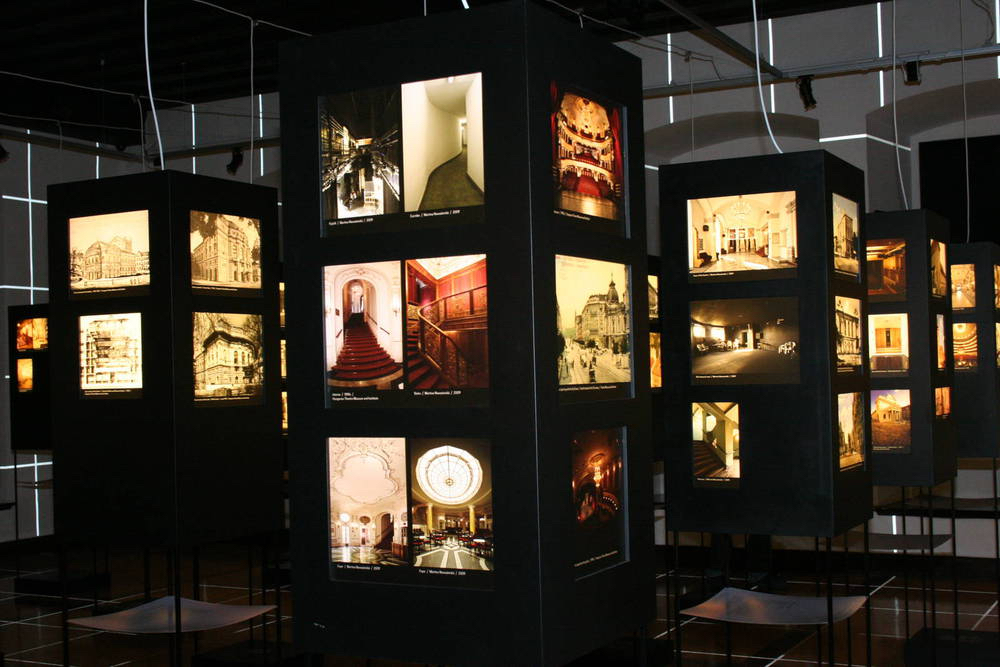 The exhibition Beyond Everydayness – Theatre Architecture in Central Europe, which toured Budapest, Prague, Warsaw and Bratislava, was hosted by the Museum of Architecture and Design in Ljubljana in 2011, summarizing the results of an extensive multiannual research.
The exhibition Beyond Everydayness – Theatre Architecture in Central Europe, which toured Budapest, Prague, Warsaw and Bratislava, was hosted by the Museum of Architecture and Design in Ljubljana in 2011, summarizing the results of an extensive multiannual research.
European Route of Historic Theatres
As a kind of follow-up, SLOGI joined another EU supported project for the period 2012–2017: European Route of Historic Theatres organised by Perspectiv, Association of Historical Theatres of Europe based in Berlin, hand-in-hand with partners from 12 countries. The Adriatic Route of Historic Theatres comprises also the historical buildings of the SNG Maribor and SNG Drama Ljubljana. In the period 2015–2017, the touring exhibition The History of Europe – told by its theatres was presented at theatre museums in Warsaw, Copenhagen, Vienna, Munich, Ljubljana and London.
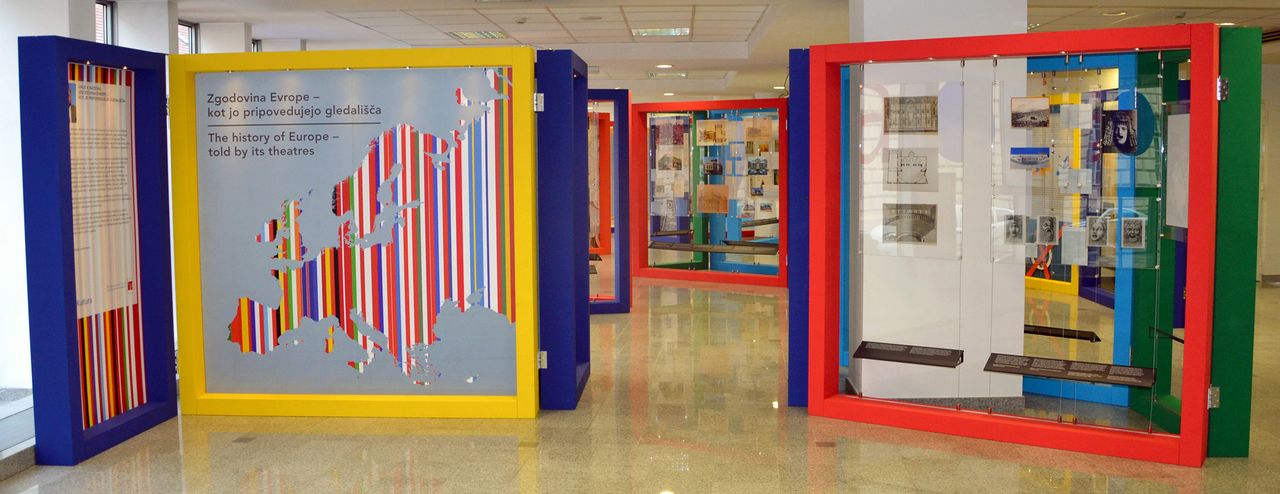 The touring exhibition The History of Europe – told by its theatres was presented by theatre institutes/museums in Warsaw, Copenhagen, Vienna, Munich, and London. In Ljubljana it was set in the entrance hall of the Ministry of Culture in 2016.
The touring exhibition The History of Europe – told by its theatres was presented by theatre institutes/museums in Warsaw, Copenhagen, Vienna, Munich, and London. In Ljubljana it was set in the entrance hall of the Ministry of Culture in 2016.
Prague Quadrennial of Performance Design and Space
In 2003, the museum organised the presentation of a costume from the Oedipus Rex production of the Slovene National Theatre Opera and Ballet Ljubljana at the Prague Quadrennial of Performance Design and Space (PQ). In 2011, the four authors presented in Prague were: Ema Kugler, Dunja Zupančič, and Miha Turšič in the section Countries and Regions, curated by Tomaž Toporišič; while a costume from A Journey to Rome (Caravaggio) (produced by Slovene National Theatre Maribor) created by Belinda Radulović was part of the Extreme Costume Design Section.
The PQ 2015 featured the installation curated by Barbara Novakovič Kolenc based on the set design by Meta Grgurevič and JAŠA for the ballet Tristan and Isolde (the national Opera and Ballet production of 2014) and on the costumes designed by Ana Savić Gecan for the performance Storm Still (SNG Drama Ljubljana). SLOGI has collaborated also with the Faculty of Architecture, University of Ljubljana and the Academy of Theatre, Radio, Film and Television (AGRFT) that prepare an installation for the PQ Student Section.
The PQ 2019 featured the installation Warped Space curated by Barbara Novakovič Kolenc, presenting the opus selection of 7 authors/art collectives (Angelina Atlagić, Uroš Belantič, Mateja Bučar & Vadim Fiškin, IRWIN, Leo Kulaš and NUMEN). More information on PQ
See also
- Slovenian Theatre Institute Library
- Amfiteater Journal
- Sigledal.org - Slovene theatre portal
- Maribor Theatre Festival
External links
- National Theatre Museum of Slovenia website
- Golden Stick (Zlata paličica) platform
- Slovenian Theatre Institute profile at Museums.si
- Slovenian Theatre Institute's collection on Europeana (contributed through the ECLAP project)
- Theatre Architecture in Central Europe project website
- Database (with galleries) of 15 Slovene theatre houses at the TACE website
- Student competition's results – A new theatre for the 21st Century in Ljubljana
Gallery
- Museums
- National museums
- Specialised museums
- Producers
- Publishers
- Literature publishers
- Exhibition organisers
- Venues
- Theatre
- Theatre museums
- Theatre publishers
- Theatre archives
- Puppetry
- Opera and music theatre
- EU funding of Slovene organisations (Culture and MEDIA Programmes)
- EU Culture funding recipient
- Prague Quadrennial of Performance Design and Space (PQ)
- National cultural institutions
- Theatre & Dance
- Dance archives and resources
- Music museums and collections
- Education and Research
- Theatre archives and libraries




